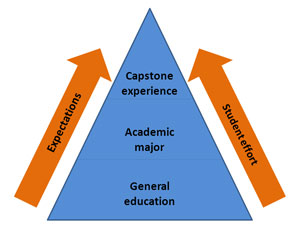By Marijn Thijs
The Capstone: from the Class of 2016 onwards, everyone has to complete it. Few however know exactly what it entails. So what is the Capstone exactly? And how does it work? TR sat down with Amand van Rossum, AAC Chair 2014-15, and discussed these changes over a warm beverage in Elliott.
What exactly is a Capstone course?
‘Essentially, the Capstone is a big piece of work, similar to a bachelor thesis one would complete at a regular university. It consists of a couple of thousand words of writing. There will be many types of Capstone. The general Capstone; in which the topic will be decided with a group of 15 maximum and the help of the professor. There will be Thematic Capstones, which are partially funded by PUUR (the Program to Upgrade Undergraduate Research). There will be connection Capstones that will focus on practical experiences and internships, and will mostly be connected to Zeeland. As the UCR community, we want to give something back to the province. Lastly, there is the possibility of having student-led Capstones. You can then propose your own Capstone, if there is a sufficient amount of people interested. A Capstone Course however does not only consist of a report, but also of a reflection, presentation and a portfolio.’’
Why did UCR start offering Capstones and why are they only mandatory now?
‘‘UCR actually was one of the only universities without a mandatory final piece of work – something in which you could prove your academic level. Since it is similar to a bachelor thesis, it looks very good on your CV and is very helpful for Master applications. The Capstones are now mandatory from the Class of 2016 onwards. UCR will switch its set-up from a 24-course bachelor to a 23+1 course bachelor, with the Capstone being the ‘+1’. One could of course also opt for an Honors Thesis or IRP, which also immediately count towards the Capstone requirement. Academic Internships could count as a Capstone, but have to be approved first.’’
What are the experiences with Capstones so far? Did many people do Capstone courses?
‘‘Last year, people were confused: was the Capstone mandatory or optional? Some students therefore enrolled into a Capstone without knowing whether it was beneficial. To most students, it simply seemed like a lot of work. Generally, the Capstone was not regarded similar to an Honors Thesis or IRP, and clarity was missing in the format. The Capstone used to have very long reflections, for example. They are removed in the new set-up. The focus is shifted towards what is most important: presenting the academic proficiency of the student.
We were planning on implementing the requirement earlier, but it didn’t make the student handbook. That is why it is still optional. It is a shame however that 2 of 3 Capstone courses are cancelled for next semester – but still I see the one course as a test run. You can already take a lot of feedback from one course, but it would have been better if there had been 3.’’
What is the AAC’s perspective on these changes?
‘‘You may see a trend in my answers: the AAC has been highly involved and has insight on the importance of a bachelor thesis: it is simply so relevant! We will be proving we are out there and we are great scholars! Half of the capstones will be newly created, so the scope of courses offered will broaden. The option to do an Honors Thesis or IRP will of course also keep in existence: they will just be a tad more challenging.’’
How should you plan a Capstone course?
‘‘Leave a timeslot in your third year! Do it in your last semester, that is better as you should be even more capable of writing a big project. You learn more and more every semester; you can develop yourself.’’
Marijn Thijs, Class of 2016, is a Linguistics, History & Economics major from Maartensdijk, the Netherlands.

